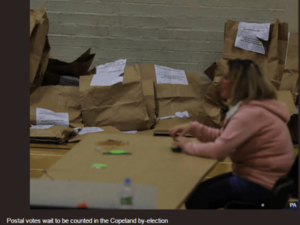Applied IF Limited
 | |
Applied IF Limited is an independent, non-partisan company that specialises in the forensic analysis of election results and has the ear of senior civil servants, the judiciary and senior police officers involved in electoral law.
2017 Copeland by-election
Applied IF Limited contacted the SKWAWKBOX with a preliminary analysis of the Copeland by-election and the results may cause shockwaves.
The crux of the matter is the legislation – from the Ballot Act 1872, though the Representation of the People Act 1983 to the Parliamentary Voting Systems and Constituencies Act 2011 – applying to the way in which votes are counted and, in this preliminary report, to the information that must be disclosed under the pertaining legisation, for an election to be lawful.
Postal votes
The key matter in the preliminary instance is the count of issued, rejected and cast votes, as the rules say that rejected and valid votes must add up to the number of issued votes (minus, in the case of postal votes, any postal votes sent out but not returned. According to Applied IF, figures for all of these must be published.
In the case of the Copeland by-election, this appears not to have been fulfilled in any respect. Here is Applied IF’s ‘Simplified Voting Count Model’ Crux report:
The picture appears clear: the absence of key information on the number of ballots issued (by post or in person), the number of postal votes not returned and the number of rejected (which is not the same as ‘spoiled) ballots means that a prima facie case exists that the election was not conducted lawfully.
This means that there is significant scope for the count not to have been conducted correctly or fairly. Especially when you consider the on-air mention (video here) by the BBC’s Tom Bateman, during live coverage, of ‘unusual’ procedures around the counting trays and David Dimbleby’s announcement on Question Time that Labour had held the seat.
Not conducted lawfully
Applied IF’s mathematicians are currently conducting an analysis of the electoral rolls, council records and voting counts to ascertain the level, if any, of discrepancies in the process and the result. Details will be published on this blog as soon as available.
Until that point, nothing definitive can be said about the outcome of the election – but based on the information available so far, Applied IF insists that it can already conclude that the election was not conducted lawfully, which should be of serious concern to every reader, regardless of political leaning or party allegiance.[1]
